- Home
- Jane Peart
Yankee Bride / Rebel Bride Page 11
Yankee Bride / Rebel Bride Read online
Page 11
One of the ladies, Natalie Harding, is remarkable in every respect—in appearance, tall and willowy with chestnut hair and glorious eyes; in personality, gracious; in intellect, keen and discerning. A rare woman.
We never seem to run out of topics to discuss. Books are her weakness, as they are mine, and we both thoroughly enjoy the evening musicales presented by the very talented quartet after supper in the lounge.
Natalie is interested in everything about me. She draws me out on every subject and, under her warm interest, I feel some of the reticence to express myself that I have felt over the past year disappearing. I have told her all about Montclair as she is particularly interested in customs and the lifestyle there. She was fascinated by my description of the secret door in the staircase leading from Jonathan's nursery that was once an escape route and hiding place from Indian raids when the house was built.
We did, at length, talk about slavery. I have been, it seems, under much criticism among the Northern ladies here, for having brought my baby's black nurse with me.
"Not criticism of you, dear Rose," Natalie said one day in her soft, well-modulated voice, "for you are much liked and well thought of among the ladies. It is just that perhaps you are not aware how sore a subject it is with most of us in the other states."
Rose tried to explain how Linny had been with Jonathan from the day of his birth, how the girl doted on him, seeing to his every need with loving attention.
"No one disputes that, my dear. It is the principle of the thing," she went on. "Does it not strike the very heart of one as sensitive as yourself that this poor girl is not free?"
It did strike Rose to the very heart. By her words Natalie had sprinkled the proverbial salt into the wound already opened within, a wound that she had tried to cover with acceptance because she was alone in a world that considered black people as property. What else could she do?
"You know, there are people who are helping slaves to escape, to move North, find homes, jobs, a place where they can live, work, and earn their own way, not be dependent on white owners for their very lives," Natalie began cautiously, then ventured on. "There are well-organized groups who are arranging such passages, who at the peril of their own lives, at times regularly, guide these poor unfortunates out of bondage. In the eyes of the world it seems to me the only way any white person can amend this terrible scourge on our whole country.
"It is called the Underground Railroad, and there are 'stations' along the way where the escaping slaves are housed, fed, and sheltered until another 'conductor' meets them and guides them to the next station and eventually to a place of freedom." Natalie paused. "It is all very secret, of course, because the penalties for such activity are dire, indeed, and the danger is great. It takes people of conscience, courage, and compassion to join such a movement."
Natalie's impassioned speech haunted Rose. Although the young woman never criticized her or in any manner made her feel guilty about Linny, she had brought to the surface again all Rose's original uneasiness. She determined to discuss her feelings with Malcolm when she returned to Montclair. At least, she wanted his assurance that if and when he became master of Montclair, the slaves would be freed.
Strangely enough, even with Natalie, Rose felt defensive and wanted to protest this view of slavery against what she had witnessed at Montclair—childlike people living in apparent contentment with no sign of restlessness or agitation for freedom. But the words were checked when she remembered the incident over Sergus, the plantation carpenter. She could not deny the lack of consideration for human feelings that episode implied and she felt a resurgence of horror at the system.
Rose recalled how her headmistress at boarding school reported an appeal made by Angela Grimke to "all Christian women of the Southern states," how she had passionately called upon them to persuade all the men they knew that slavery was "a crime against God and man." She urged immediate action. Women who owned slaves should free them at once, begin to pay them for their work, and educate them, whether it was against the law or not.
A sense of relief swept over Rose. At least she had done that! She had continued to teach Tilda, Carrie, and now Linny to read from the Scriptures. Almost every day they gathered around her, reading for themselves the simple, saving message. Of course, they had some difficulty deciphering the language of the Bible written in Old English. But they were all eager learners and far brighter than she had been led to believe.
Rose resolved to renew her efforts in teaching the three young black women when she returned to Montclair and she would again broach the subject with Malcolm. We cannot be separated on this, she told herself, determined to speak out boldly on what she was now convinced was a terrible evil.
It is the last night we will be here at the Springs. It has been a delightful time, perhaps self-indulgent to an extent, but, I firmly believe, an ordained time. I feel so much stronger in every way, and especially blessed to have made such a friend as Natalie. We agree it was a divine coincidence that we were both at the Springs at the same time.
Before I forget, I want to record our conversation after dinner as I think it will have special significance for me in the days ahead. Natalie walked back with me to my cottage in the soft spring twilight.
As she left me to go on to her own cottage, she looked at me with those deepset eyes and said, "Rose I think you have a special destiny. I think the Lord has placed you where you are, with all the qualities of mind and heart necessary for the work you are to do for Him. Are you—do you think—equal to the task?"
My heart began to pound and even my scalp tingled at her words. "I don't know. I'm not sure," I replied timidly.
"Remember Isaiah 6:8, Rose," she said quietly. "You, too, may be called upon to do something you feel inadequate to carry out. Sometimes there is no one else, Rose. Sometimes we are in circumstances that demand we be uniquely fitted for what needs to be done."
She put both hands on my shoulders and kissed my cheek. "Good-bye, Rose. God be with you in all you do."
We had already promised to write to each other and suddenly my throat was thick with a sorrow that welled up inside me at parting with this woman I had known such a short time but who had influenced me so profoundly.
As she disappeared into the gathering dusk, I went inside immediately and got out my Bible to look up the reference she had given me.
I repeated the words over and over, puzzled by their meaning as it applied to me.
I write the words here because I feel someday I shall understand why they were given to me: "Also I heard the voice of the Lord saying: Whom shall I send, and who will go for us? Then said I, Here am I; send me."
chapter
15
WHEN THE TRAIN pulled into the station at Richmond, Rose saw Malcolm's tall figure pacing impatiently on the platform.
Upon disembarking, she was lifted off her feet in an exuberant embrace, and her heart swelled with happiness.
"Oh, darling, darling! I'm so glad to see you!" she murmured over and over, tears filling her eyes.
"Welcome home!" Malcolm exclaimed.
Home! The word echoed in Rose's mind. Was Virginia now her home? Wherever Malcolm was had become home to her now, she realized.
Jonathan had to be admired, held, tossed, and tickled by Malcolm, with Rose pointing out all the changes and progress their little son had made in their absence. Linny stood by, beaming at the attention her cherished charge was receiving from his proud papa.
"Well, Linny, and how have you borne up under all this travel?" Malcolm challenged her.
"Jes' fine, Marse Malcolm, but sure 'nuf glad to be home." Linny grinned.
Rose's reunion with Malcolm was so sweetly tender, so joyously passionate that, as she lay in his arms that night under the lacy canopy of their great four-poster bed at Montclair, she resolved never to be separated from him this long again. She sighed with contentment as he pulled her close, and she snuggled into the curve of his arm.
The first few we
eks after her return, Rose lived in a kind of euphoria. She and Malcolm seemed to have regained the precious intimacy of their European honeymoon and the sojourn in the woodland cottage. Malcolm reveled in being with Jonathan as well. He carried the child about on his shoulders as he and Rose strolled in the garden, and rejoiced at each new word the toddler lisped.
If only it could always be this way, Rose thought dreamily, watching them. If it could only be just the three of us.
But, of course, that was not possible. Gradually the natural flow of life resumed to interrupt these idyllic times together. There were visitors, the demands of plantation management, family and social events. Increasingly, the turbulence of the political strife rampant in the country penetrated the peace and serenity of the remote, leisurely life of Montclair.
The talk Rose heard around the dinner table was disturbing. Could Southern men, many of whom had been educated in the great schools of the North, differ so drastically on principle with their Northern brothers who read the same books, the same newspapers, frequented the same libraries and museums of the world, enjoyed the music and art of the great European masters, generally professed the Christian faith, read the same Bible? Could they really believe the others to be liars and blackguards—despicable in habit, lifestyle, hopes, dreams, ideals? It seemed so.
Rose tried to discuss it with Malcolm, to share with him some of the sentiments expressed by her father and his friends. These, too, were thoughtful, patriotic men of intelligence and experience. Yet, in the North the sentiment was that slavery must be abolished if democracy as America represented it to the rest of the world was to be preserved.
Malcolm heard her out without comment. Then, using the methods of philosophic discussion he had learned at Harvard, he posed his theory for her to question.
"How, then, is the North any different from the South? We have made it a crime to teach Negroes to read and write for fear they will want to be free. In the North they keep the poor enslaved in factories and mills, uneducated, because the owners are afraid education will inspire them to demand better working conditions and higher wages. It is always the ruling class, the moneyed people, who keep others down, clutching greedily at what they have. But what does Scripture say about that sort? 'Even what they have will be taken away. . .
"You're fond of quoting Scripture, Rose. In marriage, two people become one. So if this is true, then my wealth derived from slave labor is yours as well, and your fortune, derived from underpaid workers in the mills your family owns, is mine. So I share your guilt as well as your responsibilities. Is that not so?"
Rose bit her lip and could think of no reply.
As she pondered all this, Rose's sensitive spirit was troubled. Now that she was once more living the life-style so deplored by the people in the North, she was caught in a terrible conflict of conscience. The words Natalie Harding had spoken to her burned like fire into her mind, smoldering there.
"Rose, you are in a position to help those poor unfortunate creatures," she had said. "Consider well what you can do." Rose had determined in her heart she must do something. But what? It all seemed so impossible. The servants did not look unhappy as they went about their work. In fact, they seemed outwardly content, she rationalized. What could she possibly do? At least she could continue the Bible instruction she had begun earlier, she reminded herself.
So Rose resumed her teaching of Tilda, Carrie, and Linny; but now that they lived in the main house, the lessons were shorter and often irregular. Carrie had other chores now that Eden Cottage was not her only responsibility; and, as Jonathan grew and was more active, Linny had less time when he was napping to spend with her studies.
Then, unexpectedly, one day something happened that was to change Rose's life irrevocably.
She and Malcolm and the baby had spent the afternoon together, walking along the riverbank, picnicking on the grassy knoll above, and wandering through the shady woods. It would, ever afterward, remain etched upon her memory as one perfect time they had shared.
It was late when they came back to the house. There would be company for dinner, and Malcolm stopped at the plantation office to check on something while Rose took Jonathan up to Linny for a bath.
When she came into her room to bathe and change, she found her mail on her dressing table. There was a letter from her aunt, one from her brother John, and another envelope, addressed in an unfamiliar handwriting.
When she opened it, she discovered it was unsigned. "It has been brought to our attention that you might be willing to help us in the transport of some merchandise," the letter began, and as Rose read on, she began to tremble. In veiled terms and ambiguous words, the writer mentioned that her name had been given as a person who would assist the illegal movement of slaves to freedom in the North.
After rereading the letter a dozen times, holding it in shaking hands, Rose felt a pressing weight that made it difficult to breathe. She took a shallow breath, almost regretting now her emotional discussions with Natalie on the inhumanity and oppression of the black people in the South. After all, she had never personally witnessed any ill treatment, nor had she heard of any cruelty inflicted upon the people owned by the Camerons or by any of the friends of the Montroses on the neighboring plantations. Maybe, as they all contended, Mrs. Stowe's heartrending story was mostly her own imagination with no particle of truth in the telling.
Shaken, she folded the letter into squares; then, on second thought, tore it into tiny pieces. The last paragraph of the letter, written in a bold, slanting hand, stayed with her as though engraved indelibly: "You will be contacted with further instructions at a future date." Not, "If you agree." It was already assumed she would be willing to do whatever was required.
Rose's heart thundered. It was her impulsive response to Natalie Harding's persuasive suggestions when they were at the Springs that had put her in this untenable position, she was sure. Rose never dreamed that their fervent discussion of slavery would have such far-reaching results. Now she had become, unknowingly, a link in a chain of events over which she had no control, involuntarily a"station"of the Underground Railway. It was her revelations about the secret passageway at Montclair that had brought this about. Now she recalled how intently Natalie had questioned her about the underground tunnel through the woods to the river—all for the purpose of investigating its possible use as an escape route for runaway slaves.
For days Rose walked on the knife's edge of fear. Suppose someone in the household found out? Suppose someone approached her openly? Suppose Malcolm were to discover her connection with this group? Or worse still, her father-in-law? Rose's nerves grew taut. Then, when weeks passed and she heard nothing further, she pushed her fearful thoughts to the back of her mind.
Rose was grateful when the news of Leighton's engagement to the Camerons' cousin, Dove Arundell, was announced. Plans for a gala party to be held at Montclair gave her something else to occupy her thoughts.
For all her fragility, Sara Montrose was adept at planning elegant parties. Her talent for entertaining had made Montclair famous, and she began at once, enlisting Rose and Garnet in carrying out her plans.
For once Garnet seemed all smiles and sweetness as she assisted in addressing invitations, suggesting a tableau to make guests aware of the engagement. She was so full of life and excitement that Rose felt for the first time a thawing of the coolness between them. They spent hours together in Mrs. Montrose's sitting room and Garnet was so amusing, making frivolous comments to make Sara laugh, that what might have been a tedious chore turned into a pleasant experience.
All three of them pored over the latest Godey's Ladies' Book, selecting patterns for gowns to wear for the party, and a seamstress from Williamsburg, who had made many of Sara's beautiful dresses, came out to fit, cut, and sew.
"It is said she could be employed by some of the most famous fashion houses in New York," Mrs. Montrose informed Rose. "But she seems content to stay here, live simply, and sew for the ladies of the county."<
br />
Henrietta Colby was a quiet, gray-haired lady. Widowed when very young and left with a small child to support, she had turned to needlework and fast became known for her skill.
The final fitting for Rose's gown went quickly, with Mrs. Colby making few comments from a mouthful of pins as she measured and pinned the hem.
Standing in front of the full-length mirror, Rose mused that Mrs. Colby was, indeed, a superb seamstress. She had created the most extravagant gown Rose had ever owned. Fashioned of rose velvet, its pleated, off-shoulder neckline was edged with lace. The skirt, which would be worn over a wide hoop, was of moire shadowed silk, caught at draped intervals with small velvet roses.
After the fitting, when Rose got back to her own room and put her hand into the pocket of her pinafore, she discovered a piece of folded paper. Puzzled, she drew it out and opened it.
The words were printed in block letters and, as Rose read them, they seemed to rise up off the page and dance dizzily in front of her eyes.
EXPECT A PACKAGE OF THREE, DELIVERED TO THE SIDE ENTRANCE. HOLD SECURE UNTIL MIDNIGHT, THEN TAKEN TO THE RIVER WHERE IT WILL BE PICKED UP AND TRANSPORTED NORTH.
But it was the date that brought Rose's heart into her throat. The "package" was due the night of Dove's engagement party!
Rose began to tremble uncontrollably. Her knees felt so weak she had to sit down. The night of the engagement party! How could she ever manage to secrete three people—for that was what the "package of three" meant, she felt sure—and guide them safely through the tunnel out to Eden Cottage and then through the woods to the river?
Of course, she had walked the path often enough, both by daylight and in the evening with Malcolm, to know the way. But how would it be possible to slip three strangers—three Negro escapees with a price on their heads—as well as hers if they were caught!—past a houseful of guests?

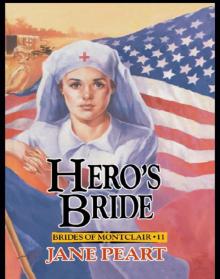 Hero's Bride
Hero's Bride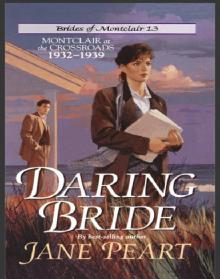 Daring Bride
Daring Bride Runaway Heart
Runaway Heart Promise of the Valley
Promise of the Valley Gallant Bride
Gallant Bride The Pledge, Value
The Pledge, Value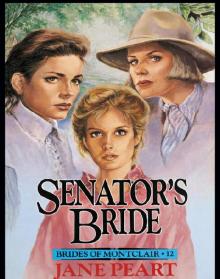 Senator's Bride
Senator's Bride Valiant Bride
Valiant Bride Shadow Bride
Shadow Bride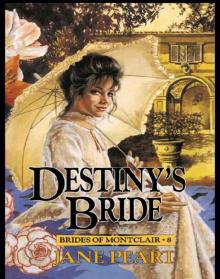 Destiny's Bride
Destiny's Bride A Tangled Web
A Tangled Web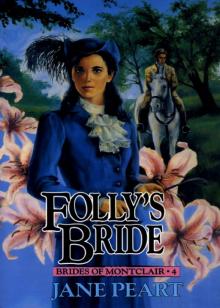 Folly's Bride
Folly's Bride The Promise
The Promise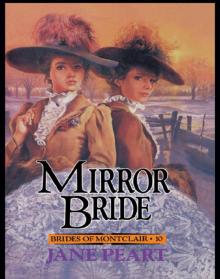 Mirror Bride
Mirror Bride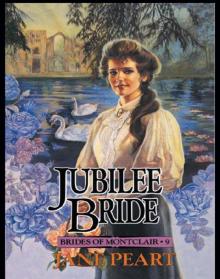 Jubilee Bride
Jubilee Bride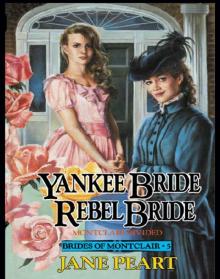 Yankee Bride / Rebel Bride
Yankee Bride / Rebel Bride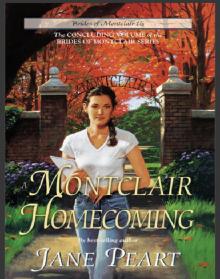 A Montclair Homecoming
A Montclair Homecoming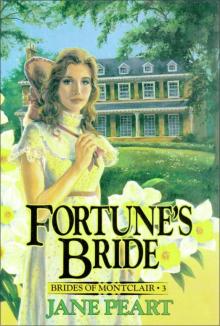 Fortune's Bride
Fortune's Bride Undaunted Spirit
Undaunted Spirit Love Takes Flight
Love Takes Flight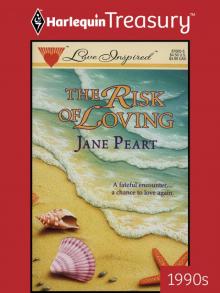 The Risk of Loving
The Risk of Loving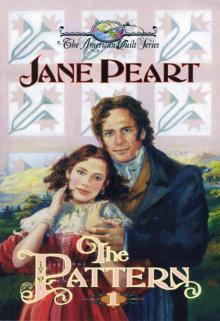 The Pattern
The Pattern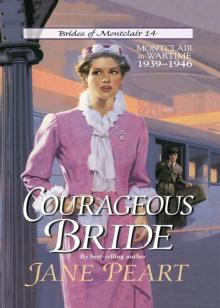 Courageous Bride
Courageous Bride